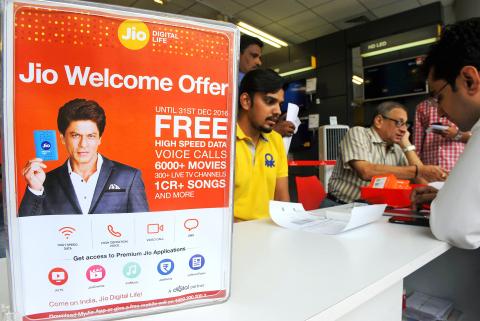Outside a tiny Reliance Industries Ltd store in a trendy Mumbai neighborhood, residents queued for hours last week for a new SIM card promising free data — and a dramatic reshaping of the Indian mobile landscape.
Mukesh Ambani, India’s richest man, announced his long-awaited Reliance Jio 4G network with an audacious free service for the rest of the year, followed by vastly cheaper data plans and free voice calls for life.
Anticipating the shake-up, rival Bharti Airtel Ltd has already slashed 3G and 4G prices by up to 80 percent while Vodafone Group PLC has heaped more data into its prepaid tariffs.

Photo: AFP
India’s mobile market is plagued by patchy reception, frequent call drops, erratic pricing and 3G internet speeds that fluctuate wildly. However, analysts said competitors will struggle to match the deep pockets of a startup backed by Reliance Industries, the energy-to-chemicals conglomerate.
With his US$20 billion investment in mobile, Ambani is betting on a fast-evolving Internet landscape in a country where nearly 1 billion people are still not online.
Public Wi-Fi is scarce and broadband access is weak, with many rural areas lacking the infrastructure to deliver high speeds.
Most of the hundreds of millions of Indians coming online over the next decade will start with smartphones, something being avidly targeted by tech giants Google and Facebook Inc.
Ambani hopes to win over those who have never had an Internet connection and for whom mobile data was previously unthinkably expensive, with a high-speed 4G covering 90 percent of India by March next year.
“This is going to change the dynamics of the game,” Mumbai-based Ipsos Business Consulting research director Bhasker Canagaradjou said, adding that data use was already growing at an “exorbitant” rate.
Under the Reliance plans, a gigabyte of data costs as little as a tenth of the previous 250 rupees (US$3.74). The company seeks to upend a market at present two-thirds dominated by three players — Airtel, Idea Cellular Ltd and Vodafone — saying it aims to secure 100 million customers in the shortest possible time.
Combined with ever-cheaper smartphones, Reliance’s new 4G network will swell the number of Internet users and prompt those already using data, millions of them on sluggish 2G networks, to upgrade.
As the battle heats up, with mobile providers eschewing profitability to gain a foothold, analysts say smaller providers such as Tata Docomo or Aircel Ltd might be forced to merge or go under.
“Jio will make a major dent and lure away consumers in the near future,” said Nikhil Pahwa, founder of Medianama.com, a digital media news site. “With increased competition and price wars, many smaller players will find it difficult to survive.”
However, while freebies have won it attention, the proof will be in the service, analysts said.
While low income customers — who often use two SIM cards in the same phone to hop between plans — might switch straight away, better-off users are more likely to wait and see.
Others suggest it is an eye-catching gimmick and that, as with most things, free does not really mean free.
Mumbai-based SAMCO Securities research director Umesh Mehta said that “hidden costs and indirect charges” meant the savings would not be as great as the marketing campaigns suggest.

SEEKING CLARITY: Washington should not adopt measures that create uncertainties for ‘existing semiconductor investments,’ TSMC said referring to its US$165 billion in the US Taiwan Semiconductor Manufacturing Co (TSMC, 台積電) told the US that any future tariffs on Taiwanese semiconductors could reduce demand for chips and derail its pledge to increase its investment in Arizona. “New import restrictions could jeopardize current US leadership in the competitive technology industry and create uncertainties for many committed semiconductor capital projects in the US, including TSMC Arizona’s significant investment plan in Phoenix,” the chipmaker wrote in a letter to the US Department of Commerce. TSMC issued the warning in response to a solicitation for comments by the department on a possible tariff on semiconductor imports by US President Donald Trump’s

‘FAILED EXPORT CONTROLS’: Jensen Huang said that Washington should maximize the speed of AI diffusion, because not doing so would give competitors an advantage Nvidia Corp cofounder and chief executive officer Jensen Huang (黃仁勳) yesterday criticized the US government’s restrictions on exports of artificial intelligence (AI) chips to China, saying that the policy was a failure and would only spur China to accelerate AI development. The export controls gave China the spirit, motivation and government support to accelerate AI development, Huang told reporters at the Computex trade show in Taipei. The competition in China is already intense, given its strong software capabilities, extensive technology ecosystems and work efficiency, he said. “All in all, the export controls were a failure. The facts would suggest it,” he said. “The US

The government has launched a three-pronged strategy to attract local and international talent, aiming to position Taiwan as a new global hub following Nvidia Corp’s announcement that it has chosen Taipei as the site of its Taiwan headquarters. Nvidia cofounder and CEO Jensen Huang (黃仁勳) on Monday last week announced during his keynote speech at the Computex trade show in Taipei that the Nvidia Constellation, the company’s planned Taiwan headquarters, would be located in the Beitou-Shilin Technology Park (北投士林科技園區) in Taipei. Huang’s decision to establish a base in Taiwan is “primarily due to Taiwan’s talent pool and its strength in the semiconductor

French President Emmanuel Macron has expressed gratitude to Hon Hai Precision Industry Co (鴻海精密) for its plan to invest approximately 250 million euros (US$278 million) in a joint venture in France focused on the semiconductor and space industries. On his official X account on Tuesday, Macron thanked Hon Hai, also known globally as Foxconn Technology Group (富士康科技集團), for its investment projects announced at Choose France, a flagship economic summit held on Monday to attract foreign investment. In the post, Macron included a GIF displaying the national flag of the Republic of China (Taiwan), as he did for other foreign investors, including China-based